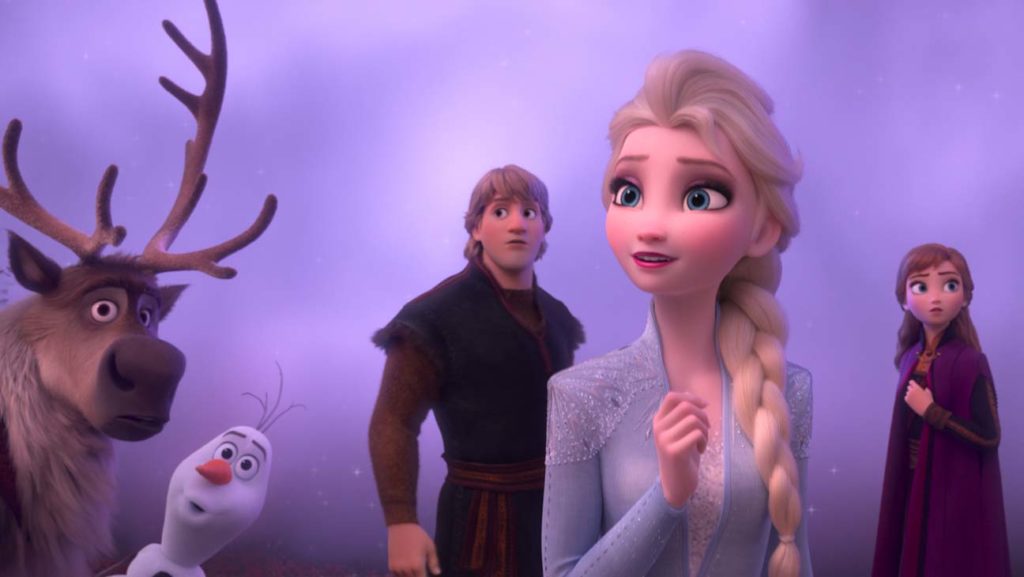A chorus of singers chants a Norwegian song in harmony as Disney’s iconic Cinderella palace appears on the movie screen. Once the music fades, the theater is left in momentary silence. Then, “Frozen II” opens with the main characters Elsa and Anna as children playing in the snow.
“Frozen II” starts with a flashback to Elsa and Anna’s childhood, much like in the first movie. After the flashback scene, the real storyline begins, starting off a few years after the events of the first film.
“Frozen” and “Frozen II” share a laundry list of similarities. They both feature the same main cast, Elsa (Idina Menzel), Anna (Kristen Bell), Kristoff (Jonathan Groff) and Olaf (Josh Gad), and they have the same directors and songwriters. But “Frozen II” goes far beyond what its predecessor achieved. This sequel, unlike other Disney sequel endeavors like “Ralph Breaks the Internet” and “Finding Dory,” is more than just a cash-grab. It is a film that offers important messages, boasts an outstanding cast and soundtrack and stands to be one of the greatest animated films of the year.
One aspect of “Frozen” that originally set it apart from other Disney films was how it handled the concept of mental illness and isolation. These themes are fairly mature concepts, but the film was able to miraculously make the conversation palatable for people of all ages. “Frozen II” takes the discussion even further, pushing the lessons beyond what one would expect from a Disney movie. As the film builds towards its climax, Anna reaches her lowest point. She sits alone, weak and broken on the floor of a cave, and she shakily sings into the dark, “I’ve seen dark before/ But not like this/ This is cold/ This is empty/ This is numb … / Hello, darkness,/ I’m ready to succumb.”
The heavy subject matter and Bell’s painfully tender, vulnerable performance hits like a ton of bricks. Anna, who is constantly portrayed as hopeful and warmhearted, has now reached a point at which she cannot even rise to her feet and continue on. While the first movie dabbled in these bleak themes, most viewers probably did not expect a Disney heroine to fall into what is quite literally portrayed as deep and unyielding depression.
This clear conversation about mental illness and its impact carries into other aspects of the film through well-timed, dark comedic moments. These moments are mostly offered by Olaf. For the entire movie, the lovable snowman who likes warm hugs seems to be going through what can only be described as an existential crisis. He worries that things are changing and constantly asks for reassurance from his counterparts that everything will be okay, mainly in laugh-out-loud jokes. However, the quips hold an undertone of deep-rooted anxiety that many young adults and teenagers can relate to, making the movie so much more than just another children’s film. A criticism of “Frozen” is that Olaf is a stupid character who makes dumb, unfunny jokes, but Olaf is so much more in this film. He is a surprisingly relatable force.
As expected, composer Christophe Beck and lyricists Kristen Anderson-Lopez and Robert Lopez once again worked their magic when it came to the music. Although it is unlikely that many young children will belt these new songs like they once did with “Let It Go,” the music in “Frozen II” is enchanting and intricate. The songs break away from Disney’s usual formula, utilizing minor keys, swelling, complicated harmonies and even rock ballad–inspired guitar chords. The lyrics relate to the movie’s events perfectly, and the musical motifs tie the soundtrack together nicely.
It might be controversial to claim that the music in “Frozen II” is better than in the first movie, but it is not a tough argument to make. For one, Elsa has two songs instead of one, showing off Menzel’s powerhouse vocal talents even more than in “Frozen.” The lovable ice salesman Kristoff actually sings this time, giving his character some well-deserved individual screen time.
It is understandable that audiences are tired of sequels, but this is one everyone should not pass up seeing. The movie is far too amazing, intricate and well-thought-out to judge negatively just because it is a sequel. Those who will not see it on that basis simply need to let it go or else they miss the chance to experience a genuine masterpiece.




















